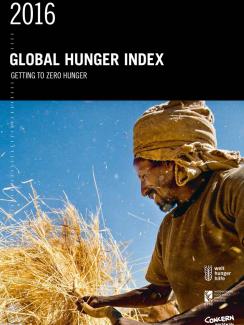Food security
Better figures

The Washington-based International Food Policy Research Institute (IFPRI) has compiled the annual Global Hunger Index (GHI) for the 11th time. Its calculations are based on four indicators that reflect people’s nutritional situation: undernutrition, child wasting (too little weight in relation to body size), child stunting (reduced growth) and child mortality. The current index for all developing countries and emerging markets is 21,3. In 2000, it was 30. Accordingly, the experts reckon that hunger has been reduced by 29 %. IFPRI publishes the GHI every year in cooperation with two civil-society organisations: Concern Worldwide from Ireland and Welthungerhilfe from Germany.
At first glance, the new data look good. In 22 countries, the index has been halved – for example in Rwanda, Cambodia and Myanmar. Nonetheless, 795 million people around the world are still estimated to suffer hunger. Bärbel Dieckmann, the president of Welthungerhilfe, considers this number unacceptable, especially as children are most affected. According to the IFPRI scholars, the situation is „serious“ or even „alarming“ in 50 of the 118 countries that they have assessed.
Dieckmann finds setbacks particularly frustrating, as she stated at a public event hosted by Welthungehilfe and KfW in Berlin in October. She said that the earthquake in 2010 had undone the progress that Haiti had made up to then. After Hurricane Matthew struck recently, her organisation pointed out that the likelihood of cholera had grown in Haiti because the storm had damaged water and sanitation infrastructure.
Violent conflict is another reason of need. When people flee from war, for example, food security is reduced in poor neighbouring countries, according to Dieckmann.
To judge by GHI numbers, Chad and the Central African Republic (CAR) are currently the two countries that hunger affects most. Many people have fled to Chad from Sudan, and the CAR was recently rocked by civil strife.
The statistics also indicate that Namibia and Sri Lanka have problems. These are the two countries for which the GHI shows the least progress since 2000. The IFPRI scholars report that Namibia has been exposed to draughts, floods and unusual patterns of rainfall, so grain production and animal keeping have been hurt. In Sri Lanka diseases are currently preventing progress, according to the GHI report.
Lack of data limits precision, moreover. The IFPRI team admits that it could not compile an up-to-date GHI for 13 countries, including Burundi, the Democratic Republic of the Congo, Syria and Eritrea. Dieckmann points out that these very countries are actually “the main challenge” since undernutrition and the other GHI indicators are probably especially pronounced there. In the case of Eritrea, the last time a GHI could be calculated was 2014. Back then, it turned out to be the world’s second worst GHI.
Ursula Hudson, a slow-food activist, says that consumers in rich countries bear some responsibility for global food security. Consumption patterns must change in rich nations, she demands. Meat production is a problem, for instance, because it requires grains that could also serve as human food. Moreover, Hudson wants more attention to be paid to rural workers’ fair remuneration.
Lea Diehl
Link
International Food Policy Research Institute, Concern Worldwide and Welthungerhilfe: Global Hunger Index 2016.
http://www.ifpri.org/publication/2016-global-hunger-index-getting-zero-hunger







